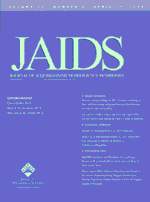Resum
Background: Female sex workers (FSWs) experience high rates of
violence from their sexual partners. Although violence is associated
with HIV risk behaviors among FSWs, there is limited evidence on
the association between violence and HIV treatment outcomes.
Methods: We analyzed data from a socio-behavioral survey with
a cohort of FSWs living with HIV in the Dominican Republic (n =
268) to describe the burden of violence from a sexual partner in the
last 6 months. We assessed the relationship between violence and
HIV treatment outcomes, comparing findings across 2 types of
sexual partners: intimate partners and clients.
Results: Nearly one-fifth of women (18.3%) experienced violence
in the last 6 months. More women experienced violence from an
intimate partner (12.3%) than a client (8.3%), with some (2.6%)
reporting both. Although violence from an intimate partner was
significantly associated with not currently being on antiretroviral
treatment [ART; adjusted odds ratio (AOR): 4.05, 95% confidence
interval (CI): 1.00 to 16.36] and missing an ART dose in the last 4
days (AOR: 5.26, 95% CI: 1.91 to 14.53), violence from a client was
associated with never having received HIV care (AOR: 2.85, 95%
CI: 1.03 to 7.92) and ever interrupting ART (AOR: 5.45, 95% CI:
1.50 to 19.75).
Conclusions: Violence from a sexual partner is associated with
poor HIV treatment outcomes among FSWs. Different patterns by
type of partner reflect how relationship dynamics may influence
these associations. Violence prevention and support services should
be tailored based on type of partner. Violence screening and referrals
should be integrated into HIV care services for FSWs to improve
their health and reduce ongoing transmission.






